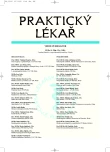Haemolytic anemia due to ribavirin – clinical observations and treatment
Hemolytická anémie po ribavirinu – klinické poznatky a léčba
Přehledný článek o hematologických komplikacích při protivirové léčbě chronické hepatitidy C kombinací pegylovaných a nepegylovaných interferonů alfa-2a nebo alfa-2b s ribavirinem. Hlavním nežádoucím účinkem kombinované léčby je hemolytická anémie, která zpravidla vzniká za 4–8 týdnů po zahájení léčby a je závislá na podané dávce ribavirinu. Hlavní rizikové faktory pro vznik hemolytické anémie po ribavirinu při kombinované léčbě jsou následující – léčba ribavirinem v denní dávce l g nebo více, vyšší počáteční hodnota hemoglobinu a nižší počet trombocytů, podaná dávka alfa-interferonu, vyšší saturace železa, fenotyp haptoglobinu, funkce ledvin (nízká výchozí clearance kreatininu), vyšší věk nemocného a pravděpodobně mužské pohlaví. Celkové riziko vzniku hemolytické anémie bylo 9 %. Epoetin alfa je velmi slibný lék pro léčbu hemolytické anémie a udržení dávky ribavirinu.
Klíčová slova:
hemolytická anémie, ribavirin, epoetin alfa, chronická hepatitida C.
Authors:
J. Stránský
Authors‘ workplace:
Přednosta: prof. MUDr. Jiří Horák, CSc.
; I. interní klinika FNKV a 3. LF UK Praha
Published in:
Prakt. Lék. 2007; 87(7): 435-437
Category:
Therapy
Overview
This article reviews the haematological complications of the antiviral treatment of chronic hepatitis C virus infection with a combination of pegylated and nonpegylated alpha-2a and alpha-2b interferons plus ribavirin. The major side effect of combination therapy is haemolytic anemia which usually develops 4–8 weeks after initiation of treatment, and is ribavirin dose-dependent. The main risk factors of haemolytic anemia due to ribavirin in combination therapy are: higher baseline haemoglobin levels and a lower platelets count, dose of alpha-interferon administered, higher iron saturation, haptoglobin phenotype, renal function (lower baseline creatinine clearance), age (older patients are more at risk) and sex (males are more at risk). Overall risk of ribavirin-induced haemolytic anemia was 9 %. Epoetin alpha seems to be a very promising drug for the treatment of haemolytic anemia and ribavirin dose maintenance.
Key words:
haemolytic anemia, ribavirin, epoetin alpha, chronic hepatitis C.
Labels
General practitioner for children and adolescents General practitioner for adultsArticle was published in
General Practitioner

2007 Issue 7
- Advances in the Treatment of Myasthenia Gravis on the Horizon
- Hope Awakens with Early Diagnosis of Parkinson's Disease Based on Skin Odor
- Memantine in Dementia Therapy – Current Findings and Possible Future Applications
- Memantine Eases Daily Life for Patients and Caregivers
- Possibilities of Using Metamizole in the Treatment of Acute Primary Headaches
-
All articles in this issue
- Psychological aspects of acute pain
- Informed consent in practice in Czech health clinics
- Estimation of the left ventricle ejection fraction based on the distance from the mitral valve anterior cusp to the interventricular septum.
- Cardiac surgery in elderly patients. Where is the risk threshold?
- Assessing oral health-related quality of life in Czech population
- Acute neuroborreliosis
- Cardiac complications of subarachnoidal haemorrhage.
- Diagnosyis – iron deficiency
- Haemolytic anemia due to ribavirin – clinical observations and treatment
- Metastatic occurrencies of the uvea
- Nutritional supplements in Cardiology. What should we recommend to our patients?
- An update on the Global strategy for diagnosis, management, and prevention of chronic obstructive pulmonary disease – as viewed from the current situation in the Czech Republic.
- Energy expenditure and options for assessing energy requirements.
- General Practitioner
- Journal archive
- Current issue
- About the journal
Most read in this issue
- Acute neuroborreliosis
- Diagnosyis – iron deficiency
- Assessing oral health-related quality of life in Czech population
- Psychological aspects of acute pain
